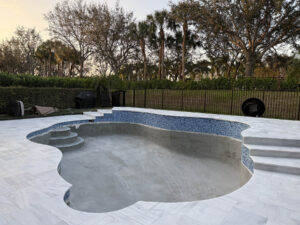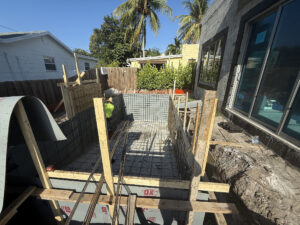This guide to new pool construction covers everything you need to know to turn that dream of a personal pool into a long-lasting, well-built reality. It’s a glamorous dream no doubt, but the work behind is not so much. Before the first tile is laid or a drop of water is poured, homeowners must understand the groundwork that goes into constructing a swimming pool. The difference between a pool that lasts 30 years and the one that cracks in a few years is the quality of planning that goes into it.
In West Palm Beach, water table runs high and the soil is excessively drained and highly permeable. Early construction decisions should take a cut-once-measuring-twice approach. A pool construction without the right preparation can settle unevenly, develop leaks, and require resurfacing far sooner than expected. Working with experienced pool builders and licensed swimming pool contractors ensures that your dream pool is as strong as it is stunning.
This guide to new pool construction highlights key planning steps Florida homeowners should know before breaking ground in West Palm Beach, Florida.
Have a Vision and a Budget in Mind
Start with complete clarity on what you want and how much you are willing to spend on it. Before speaking to any swimming pool contractors or pool builders, define exactly what you want your new pool to be like and how much you are willing to spend for it.
These questions may help you build a vision:
- What role will the pool play in your life: recreation for family, entertainment for guests, a space to unwind, or your fitness companion?
- What design features you cannot live without – a spa, waterfall, or a tanning ledge?
- How do you see the space evolving? Will you add decking, use lighting later, or install an outdoor kitchen?
Stay realistic about your pool construction cost. Homeowners typically underestimate their expenses by 10% to 20% by not accounting for extras like fencing, electrical work, and permits. Create a buffer in your budget for the unexpected expenses as well because once the ground is open, changes get expensive.
Check Your Insurance Coverage
Before breaking ground, call your insurance company, and explicitly ask if they cover new pool installations. Some companies may require separate endorsements for liability, construction, or structural protection.
You should confirm that:
- Your builder’s insurance covers accidents during construction.
- Your homeowner’s policy includes liability coverage for the completed pool.
- You understand post-construction inspection requirements.
Having the right coverage from day one means you’ll never be left with unexpected financial responsibility.
Hire Licensed Contractors: A Guide to New Pool Construction Essentials
Florida has strict licensing laws. Hiring licensed swimming pool contractors ensures your project meets state and local codes. This important early decision will protect your property and your investment.
Once you have done you research, create a shortlist of potential swimming pool contractors. Don’t pick the contractor based solely on their quotes. Here are some tips to help you in your due diligence:
- Verify the builder’s license on the website of Florida Department of Business and Professional Regulation.
- Ask for proof of insurance. The contractor should hold insurance for both liability and worker’s compensation. It is incredibly important to understand that unlicensed pool contracting can void your homeowner’s insurance, leaving you personally liable in case anything goes wrong.
- Finally, request local references to help you inspect a few finished projects they have worked on.
Once you have chosen a pool builder, it’s time to sign a contract. But, never sign vague paperwork. A detailed contract protects you from unexpected costs and clarifies accountability. Every agreement should include:
- An itemized cost breakdown: excavation, shell, finish, plumbing, electrical, and decking.
- Warranty terms: this should be supplied for both structure and equipment.
- Payment schedule: ensure it’s linked to milestones, not dates.
- Change order policy: this clause will help in handling adjustments to design and cost.
If a pool builder avoids specifics, that’s a red flag. Keep that in mind.
Understand Your Site Conditions
The soil beneath your pool is one of the most important factors in swimming pool construction. In West Palm Beach, where the soil is sandy and the water table sits just a few feet below the surface, the ground can shift and exert upward pressure on your pool shell. Without proper evaluation, any pool can develop cracks or leaks over time.
Before construction begins, ask your pool builder to conduct the following tests:
- Soil Compaction Test: This test determines how stable the ground is before excavation. Properly compacted soil prevents the pool from settling unevenly, which can cause structural stress or leaks later. According to the Florida Building Code, a geotechnical evaluation is recommended for most in-ground structures to verify subsurface conditions.
- Groundwater Table Measurement: High groundwater levels can cause upward forces that push up an overground pool installation, also known as “pool popping.” Installing hydrostatic relief valves or proper drainage systems helps balance that pressure and protect your investment.
- Site Drainage Plan: Drainage around the pool deck is just as critical as what’s beneath it. Poor surface drainage can cause erosion or puddling near your home’s foundation. A licensed contractor can design drains or pump systems to redirect stormwater effectively.
Skipping this step can result in shifting shells, cracks, leaks, and expensive pool repair services down the line. A few tests upfront can save thousands in future resurfacing or structural repairs, and ensure your new pool stays beautiful and stable for decades. These early assessments are critical parts of any guide to new pool construction in Florida, especially in areas like West Palm Beach with challenging soil and drainage conditions.
👉 If you want to understand more about pool resurfacing and its attached costs, read our detailed article on the topic.
Designing Smart: A Guide to New Pool Construction Materials
Pool design isn’t just about shape or color. It’s about how your pool ages in Florida’s sun, humidity, and salt air. Choose materials that balance aesthetics with longevity and ensure easy pool upkeep.
Here are the factors you should consider:
- Pool finishes: Pebble, quartz, or high-grade plaster withstand UV rays better than basic coatings.
- Equipment: Energy-efficient pumps and filters save long-term operational costs.
- Surroundings: Choose decking that resists heat and salt corrosion.
An experienced pool builder can guide you toward materials that minimize pool maintenance and reduce the need for early pool resurfacing or pool refinishing. Prioritizing long-term durability in your materials and systems is a core principle of any reliable guide to new pool construction.
👉 As a first-time pool owner, here is everything you need to know about pool maintenance and the pool lifestyle.
Secure Permits, Codes, and HOA Approvals
Permits are non-negotiable. Palm Beach County requires pool plans to comply with structural, electrical, and safety regulations, which includes fencing, alarms, and anti-drowning features.
Your contractor will take care of all the compliance requirements, but you should understand the basics, so that there are no slip ups.
- Submit all drawings to your local building department for approval.
- Verify setback distances, easements, and property boundaries.
- Get HOA approval if your community has design restrictions.
Neglecting permits can result in stop-work orders or, worse, removal of unapproved structures, a mistake that can easily add thousands to your pool construction cost.
Plan First So You Can Be a Happy Swimmer Later
Backyard pool is not just another home feature, but a long-term investment that returns with interest fun family times and increased home value.
As this guide to new pool construction emphasizes, each step you take before breaking ground protects your investment, reduces future pool maintenance, and ensures your pool becomes the heart of your home—not a source of stress.
Do the groundwork right, work with trusted swimming pool makers, and invest time in preparation. In Florida, where nature tests every structure, an outdoor addition like a pool should be well-planned.
- Phone: 561-702-6351
- Email: [email protected]
-
Address: 1335 Old Okeechobee Rd. #450
West Palm Beach, FL 33401 - Mon – Fri: 8:00 AM – 6:00 PM
- Sat & Sun: 9:30 AM – 4:00 PM
Photo Credit: Julius Hildebrandt on Unsplash



